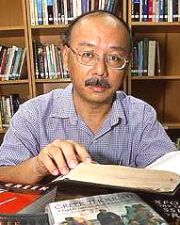Excerpt from
CHRISTIAN WITNESS IN TIMES OF POLITICAL TRANSITION (written by Kam Weng in 2001)
Possibilities for WitnessAn important question of leadership arises. Who, after all, speaks for the Christian community? Is it CFM, maverick pastors or Christian social activists? Others may wonder why we should expect the Church always to have a public opinion on issues. Impatient youths will find such questions to be unnecessary diversions given their sense of urgency to translate ideals into action. However, it would be naïve to imagine that one enters into politics merely to promote a set of social ideals. Politics is, after all, about gaining power to implement a specific ideology (a plan for social engineering). Realistically speaking, this strategy for changing society from above is not an option for the Malaysian church. The Church is only a small and insignificant player in an arena where power sharing is based on the number game, that is, power is apportioned according to the player’s ability to mobilize large followers on its side.

The wider public, however, is open to proposals for reform, provided that these reforms are cogently presented. That being the case, it would be better for Church officials to adopt a focused agenda and address issues within their competence. Historically, these have been matters related to education, welfare and fundamental rights since they have natural affinities to the preaching of the Gospel. We should not underestimate the influence of a creative minority that not only offers an agenda for social reforms but demonstrates how it can be implemented in a social context. In this regard, the first responsibility for Christians is to be the church, that is, a community with an inner life that embodies the ideals which it recommends to wider society.
Admittedly, the Malaysian Church is marginal in the political game, but surely the opportunities for social engagement should not be restricted to direct political action. We do well to remember that while “everything is politics, politics is not everything.” Likewise, the Church’s goal in social engagement is influence rather than social control. The Church as a social institution supports just policies and not specific political party. Such considerations suggest that Christian initiatives for social change must begin at the grass roots. I have in mind the example of the early Church which out-loved and out-thought their contemporaries.
The Church should develop educational programs to build up a citizenry that has the moral discipline without which democracy degenerates into selfish competition and without which it would be difficult to enforce law and order. That is to say, the Church’s contribution is to shape the ethos or moral environment of social institutions. It is arguable that in the long term such moral formation is more crucial than policy prescription.
Seen in this light, Churches may support and implement their own programs of social services (works of mercy) in order to inculcate habits of good moral choices among its members. This initiative should be seen as a pre-requisite for social action (which seeks to change public policy) to ensure that social welfare is more than band-aid social engagement. Still, to gain a hearing the Church must demonstrate through its works of mercy that it has the capacity to transcend self-interests.
Christian Witness to Political PowersChristian youths, especially those with a passion for justice, have been strident in their call to the Church to be faithful to its prophetic calling and engage with issues of wider society. Church leaders should not dismiss these calls just because they reflect the impatience of idealistic youths. Nevertheless, it is also reasonable to question the tendency to associate prophetic witness with negative judgment against the status quo. Nor should it be assumed that solidarity with marginal groups necessarily entail adoption of an antagonistic posture against the status quo.
Christian activists must avoid two extremes. On the one hand, it is easy to lash out in self-righteous anger. But political engagement should not be driven by anger arising from despair or self-righteousness. Otherwise the Gospel can be exploited to justify our own anger. On the other hand, Christian leaders could compromise in order to live an undisturbed existence on terms set by the government. Romans 13: 1-5 has served as a convenient justification for this course of action. Either way, we are painfully aware that our motives are mixed despite our insistence on taking the path of Christian obedience.
The message of Christian freedom is relevant precisely because of the ambiguities of politics. The Church should maintain flexibility in deciding whether to support or reject public policy on a case-by-case basis. The Church discharges a prophetic ministry when it supports oppositional critique towards wrongdoings. It mediates a priestly ministry when it sides with reform movements within the government. The two approaches complement each other. Christians in one ministry must to give the benefit of doubt to the brother in the other ministry. Christian brotherhood must transcend political differences. Above all, the Church must reject any tendency to politicize faith to ensure that it makes an impact beyond sectarian interests.
Every government has the responsibility to maintain justice for all citizens. But governments often neglect their duty to promote just policies that promote welfare for all citizens and justice for the common good. Under such circumstances, the Church must have the courage to remind the government of its social contract and election promises. Finally, if the government should violate its legitimate bounds of authority, the Church must have the courage to call on the government to be accountable to a higher transcendent authority and be judged by laws of natural justice.
 This is from Bob Teoh, A Christian journalist in Kuala Lumpur, Malaysia
This is from Bob Teoh, A Christian journalist in Kuala Lumpur, Malaysia


























